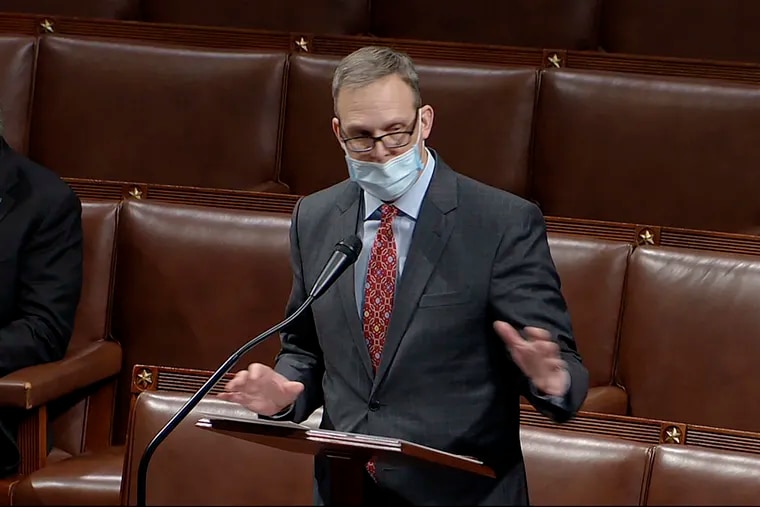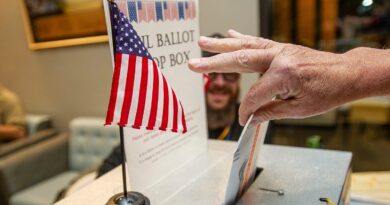Pa. Rep. Scott Perry was part of a top meeting with Trump officials as they plotted to reverse the 2020 election, report says

Days after the 2020 election was called for Joe Biden, some of then-President Donald Trump’s top aides gathered for a crucial meeting, including chief of staff Mark Meadows, campaign manager Bill Stepien, close adviser Stephen Miller, and press secretary Kayleigh McEnany.
Joining them was Rep. Scott Perry, a Republican from Pennsylvania, in a session that set the course for Trump’s attempts to try to undo Biden’s lawful win, said a report Thursday from the New York Times.
The report underscored the emergence of Perry, a hard-right figure from York County, as a key ally in Trump’s continuing battle to raise doubt about his defeat and overturn a lawful election result.
The group meeting at Trump’s campaign office in Arlington, Va., settled on a strategy of attacking the election as tainted, pursuing legal actions and alleging fraud, the Times reported, even though numerous audits, recounts, reviews, and a Department of Justice inquiry have since shown no fraud significant enough to affect the outcome. Most recently, an Associated Press review of key contested states found only 26 “questionable” votes in Pennsylvania, where Biden won by 80,000 ballots and more than 6.8 million presidential votes were cast.
Perry didn’t respond to a request for comment for this article. A spokesperson for Rep. Jim Jordan (R., Ohio), who was also reportedly at the meeting, said the gathering was to discuss media strategy, not to overturn the election, according to the Times.
Perry has in fact sought in numerous ways to raise questions about the election result and stop it from being certified. His role reached its most visible point when Perry spoke on the House floor in the early hours of Jan. 7, leading the charge to throw out all of Pennsylvania’s presidential votes, just hours after rioters who believed the election conspiracies had rampaged through the Capitol and sent lawmakers fleeing for safety.
The meeting is the latest in a long list of revelations about Perry’s work to block the election results, based on false claims, even if it meant disenfranchising voters in his own state. He has become a subject of scrutiny for congressional investigators and cited by Senate Democrats as one of the leading figures in attempts to target Pennsylvania’s votes, even though Perry himself was reelected in the same election he has challenged as illegitimate.
In one call, on Dec. 27, Trump specifically cited Perry, Jordan, and Pennsylvania State Sen. Doug Mastriano while talking with acting Attorney General Jeffrey Rosen and his top deputy, Richard Donoghue, according to the Democratic report, which cited testimony and notes from Donoghue. Trump urged the country’s top law enforcement officials to “just say the election was corrupt and leave the rest to me and the Republican congressmen.”
Perry is also in line to play a major role in shaping policy debates and Republican actions in the House, if the GOP regains control of the chamber in next year’s elections, as it is favored to do. He was recently elected chairman of the hard-right Freedom Caucus, following in Jordan’s footsteps as leader of a group that has often steered GOP policy in the House.
Here’s what else we know about his efforts to stop the election results:
A 394-page report issued in October by Democrats on the U.S. Senate Judiciary Committee showed that Perry directly contacted Donoghue, the Justice Department’s second-ranking official, to reinforce Trump’s baseless claims about the election, and urge the department to investigate debunked accusations.
Perry forwarded to Donoghue a report alleging to show more votes than voters in Pennsylvania, as evidence of potential fraud in the state. When it was then passed to the Trump-appointed U.S. attorney for Western Pennsylvania, Scott Brady, he called its claims “not well founded.” The report was based on incomplete information, though Perry continued citing it well after it was debunked.
The report urged further scrutiny of Perry’s actions by the bipartisan House committee investigating the Jan. 6 attack.
» READ MORE: Far too little vote fraud to tip election to Trump, AP finds
When DOJ officials appointed by Trump said they found no evidence of large-scale fraud that could have affected the election results, Perry pushed to put someone more compliant in charge.
Perry brought Philadelphia-born attorney Jeffrey Clark to meet with Trump in the Oval Office on Dec. 23, according to the Senate Democrats’ report. Later, according to Donoghue’s notes, Perry called Donoghue’s cellphone, at Trump’s behest, to say that the department hadn’t done its job, praised Clark, and said something along the lines of: “He’s the kind of guy who could really get in there and do something about this.”
Clark, an attorney in the DOJ’s civil division, had no clear nexus to the election investigation, according to Democrats, but pressed top DOJ officials to issue a letter saying they were investigating election fraud in key swing states. Trump later considered making Clark the attorney general, only to back down when faced with threats of high-level resignations.
In January, Perry acknowledged connecting Trump and Clark, issuing a statement saying that “When President Trump asked if I would make an introduction, I obliged.”
When lawsuits and political pressure failed, Perry led the charge to throw out all of Pennsylvania’s electoral votes — raising the objection on a shaken House floor hours after the Jan. 6 riot, with broken window panes as a backdrop.
“The Constitution is just a piece of paper, it cannot defend itself,” he said then.
He was one of eight Pennsylvania Republicans, out of nine in the House, who voted to throw out the state’s votes.
» READ MORE: Fact-checking Trump’s false claims about Pennsylvania’s election before his supporters attacked the Capitol


